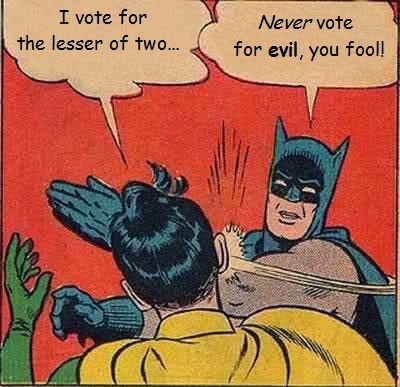 |
| *In case you've never seen all of Star Wars, read about Palpatine here. |
In regards to voting, Catholics are taught that
there are some policies which we just cannot reconcile with the common good,
and so we cannot in good conscience vote for a candidate who supports those
policies. The policy that probably comes
to your mind first is abortion. In
general, the Democratic Party in the U.S. is supportive of legalized
abortion. The Republican Party, in
general, opposes laws which permit abortion.
No matter what other policies these two parties support, abortion just
cannot be ignored when it comes time to cast your ballot. It seems that, as a Catholic who regards all
fetuses as human individuals, the decision is a no-brainer: The common good is drastically opposed to the
Democratic Party simply by that one token.
Yet, there is a grave problem in concluding that, therefore, one must
vote Republican. This strikes me as
utterly narrow-minded and reminds me of the Jedi Council rallying the clone
army under Chancellor Palpatine.* It’s a
trap.
There is a fallacy named the “false dichotomy” whose
definition helps us to understand the conundrum of which I speak. A false
dichotomy is a presentation of two
points of view as if they were the only options, whereas others are available. For
example, “If you’re not a conservative, you’re a liberal” is a false
dichotomy. This only begins to express
the whole problem of choosing a Republican over a Democrat.
 |
| Who would you vote for? Sure Lex Luthor is a bad guy, but he's great compared to Galactus! |
By now, you might be thinking “he’s alluding to
third party candidates, but he might as well just not vote.” It is sad but true, that to vote for somebody
who is neither a Republican nor a Democrat is probably to throw one’s ballot
into a three percent margin. It seems
that third party voters might as well stay home on Election Day. My point here, though, is not a pragmatic
one. It is a moral one. Catholics are not Utilitarians by principle;
the consequences of an action do not make it good. In fact, the principle by which most
conscientious voters operate is to “choose the lesser of two evils,” in which
case many consequences of the action would still be bad, just not as bad as the alternative. Cut your losses, so to speak.
But less evil is still evil. Also, voting for a third party who would very likely not succeed is not equivalent to staying home and refusing to vote. That is, action is still action, regardless of your success. Is it better to try for the best possible option and fail or to compromise and succeed in securing evil? If you still do not see how Republicans could be so bad, compared to everything Democrats stand for, have you ever considered the accusations against Republicans made by Democrats? Have you ever considered that they might be true, regardless of the source’s own problems? You might be thinking, “Sure, the GOP has its problems, but they’re not nearly as messed up as the Liberals’.” This may be true, but it leads me to my main point.
But less evil is still evil. Also, voting for a third party who would very likely not succeed is not equivalent to staying home and refusing to vote. That is, action is still action, regardless of your success. Is it better to try for the best possible option and fail or to compromise and succeed in securing evil? If you still do not see how Republicans could be so bad, compared to everything Democrats stand for, have you ever considered the accusations against Republicans made by Democrats? Have you ever considered that they might be true, regardless of the source’s own problems? You might be thinking, “Sure, the GOP has its problems, but they’re not nearly as messed up as the Liberals’.” This may be true, but it leads me to my main point.
Here, I will define a fallacy which is based on the
false dichotomy. It is called “Satan’s Razor” and it is the mechanism by which a false dichotomy is
created between two evils so that one is made to look good in contrast to the
other. Consider, for example,
Communist Russia vs. Nazi Germany, using condoms vs. spreading HIV, or Godzilla
vs. King Kong. It is an insidious and
clever lie to say that, because one stance is so evil, you are morally obliged
to support its opposite. The “razor”
trick is ubiquitous, driving arguments from education (either feed the system
or go stupid) to environmentalism (either abuse nature or don’t touch it). As soon as you decide to support one side against
the other, you have fallen into the trap.
The morally conscious person is thoughtful with his
principles and careful in his decisions.
Evil is nothing more than a defect; a flaw in something otherwise
good. The world is not a duality, a
struggle between good and evil. It is
altogether good yet defective. Instead
of trying to fix one defect by increasing another, step back and think about
what is really good and choose that. If
your efforts at a solution fail, at least you know that you did not contribute
to the problem.

No comments:
Post a Comment